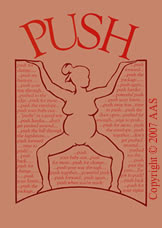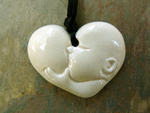A Standard of Care in obstetrics is long overdue and much needed. Adequate and reliable research on just about any aspect of hospital birth is impossible because of the lack of a standard of care and non-peer oversight. This allows non-researched, non-science-based procedures and interventions to continue to be used in non-medically necessary ways while continuing to promote them as safe. Meanwhile, ancedotal stories collect about the experience of women and babies in birth. Mainstream journals report serious consequences of interventions, but the practices continue. This is allowed in part because there is no apparent way to research the effects of interventions.
Medical science and doctors are big on studies with control groups rather than retro studies -- as they proceed through the decades of studying obstetrics on on non-consenting, non-informed babies and women. For example, researchers have divided birthing babies into groups to receive different doses of epidural bupvicaine and fentanyl mixtures (drugs NEVER shown to be safe in the first placce!! Animal research has more stringent rules and ethics to protect animals than for our own babies. It's a shame. Meanwhile, we ought to have many decades worth of data to do retro studies, but we don't because obstetrics polices itself, makes the rules, decides who, what, and how -- based on self-serving needs and based on peer-research and peer-overseeing. The fox is guarding the hen house.
"It seems pretty clear that there is a serious problem with relying on birth certificate data to determine pregnancy complications..." From How Well Do Birth Certificates Describe the Pregnancies They Report? The Washington State Experience with Low-Risk Pregnancies, Dobie, Baldwin, et al., Maternal Child Health Journal, 2:3, September 1998.
Nearly ten years later this information has not translated or transformed into meaningful change to make birth SAFER for women and babies (it's the baby's birth!!). When I spoke to the person in charge of Missouri's state data collection bureau I was told that it is impossible to do research on birth related subjects, such as the incidence of intervention and cesarean birth -- because there is not a mandated or consistent format. If you know of even ONE state that has a "Standard of Obstetric Care" please let me know. A physician I worked with explained the "categories" under which complications from cesarean section can be distorted -- and it ain't for the benefit of the mother or baby, but for the hospital. Women and babies are merely objects to be manipulated. Each hospital has the freedom to work it's own magic to create the data it needs. Doctors, the worker bees, meet their quotas to create the revenue and avoid malpractice loss.
A few years ago I ordered the hospital records from my daughter's birth in 1994. Imagine my surprise to find not even a mention of the Cytotec and epidural anesthesia. Forget it being on the birth certificate. It's not important to the birth certificate, but it is important for the medical history of a child? You bet it is --- even though not one pediatrician will use labor and birth experience information in making a diagnostic determination of anything whatsoever. For the medical community, birth which supports 60+% of the hospital coffers is insignificant.
How can a civilized, research/science-based society even begin to evaluate the outcome possibilities of the use of decades of research when there is no documentation of the birth experience? Correlations and patterns emerge over time (increase in asthma, ear infections, behavior disorders) in induced, epidural, and surgical births, but how to truly study their effects on the human and on society? Obstetric medicine will not financially support such studies. Drug companies won't. Hospitals institute rules about records, proctols, filming that serve their privacy and protection - not the mother and babies.
What was interesting about my daughter's birth records was that I received detailed documentation of a three hour visit to the LD floor about three weeks before her birth. I had a gall bladder attack and it was ORDERED that I be monitored to make sure I wasn't in labor. I'd had three previous labors and many episodes of gall bladder "attacks". I knew the difference, but had to be monitored. But not even the documention or mention of receiving narcotic epidural anesthesia. And, I was "high risk" -- age 37, if you believe that is high risk. But no mention of the Cytotec and epidural, both life-endangering.
Recently, I attended a birth where the RN spent a considerable amount of her time tapping away on the computer monitor taking notes. About what??? And, it was so annoying to hear -- so disregardful of the mother and baby. With all that documentation goin' on there surely must be mountains of documentation to provide information for mulitple studies in pre and perinatal psychology and to begin to make correlations between events, interventions, complications and the impact on the human. It would extremely easy to look at the cat scans of baby's brains and compare homebirth experience to hospital experience. A recent study showed brain bleeds but did not apparently look at the inteventions -- such as induction, supine position, epidural -- but concluded vaginal birth as the cause. How about scanning the brains of babies born at home and comparing them to babies born in hospitals and looking at the impact of different interventions?
Who would fund such a study to look at the incidence of induction and epidural, planned vs emergency cesarean, with homebirth and natural labor, without interventions?
We need to begin to demand that hospitals and doctors submit to outside oversights, that every aspect of the birth experience is documented, and we need to demand that obstetrics PROVE that drugs and interventions are safe for the birthing baby. PROVE that the baby cut by surgeon's knife, under narcotic sedation, and separated from her mother is "just fine" and that the myriad of social, relationship, and psychological issues in our society are NOT from the early experience of birthing with our mothers on her back, tied down, drugged, alone, separated from her baby.
Prove the safety of drugs and interventions! Stop experimenting on our babies. You, me, we are all one long medical experiment. It's like a science-fiction movie and we can't get out of it.
The Other Side of the Glass
Part One was officially released June 2013 in digital distribution format.
To purchase to to www.theothersideoftheglass.com
If you were a donor and want to download your copy send an email to theothersideoftheglassfilm@gmail.com.
The trailer
Friday, March 02, 2007
Subscribe to:
Post Comments (Atom)
"Soft is the heart of a child. Do not harden it."
A public awareness reminder that things that happen behind the scenes, out of our sight, aren't always as rosy as we might think them to be. Perhaps its a restaurant cook who accidentally drops your burger
on the floor before placing it on the bun and serving it to you. Here it's an overworked apathetic (pathetic) nurse giving my newborn daughter her first bath.
Please comment and rate this video, so as to insure that it is viewed as widely as possible, perhaps to prevent other such abuse. -- The mother who posted this YouTube. How NOT to wash a baby on YouTube
Are you going to try to tell me that "babies don't remember?" There is no difference to this baby's experience and the imprinting of her nervous system/brain and one that is held and cleaned by the mother or father either at the hospital or at home?
By the way, this is probably NOT the baby's first bath. The nurse is ungloved. Medical staff protocol is that they can't handle a baby ungloved until is has been bathed (scrubbed if you've seen it) because the baby is a BIO-HAZARD -- for them. Never mind that the bio-hazard IS the baby's first line of defense against hospital germs.
Missouri Senator Louden Speaks
Finally, A Birth Film for Fathers
Part One of the "The Other Side of the Glass: Finally, A Birth Film for and about Men" was released June, 2013.
Through presentation of the current research and stories of fathers, the routine use of interventions are questioned. How we protect and support the physiological need of the human newborn attachment sequence is the foundation for creating safe birth wherever birth happens.
Based on knowing that babies are sentient beings and the experience of birth is remembered in the body, mind, and soul, fathers are asked to research for themselves what is best for their partner and baby and to prepare to protect their baby.
The film is designed for midwives, doulas, and couples, particularly fathers to work with their caregivers. Doctors and nurses in the medical environment are asked to "be kind" to the laboring, birthing baby, and newborn. They are called to be accountable for doing what science has been so clear about for decades. The mother-baby relationship is core for life. Doctors and nurses and hospital caregivers and administrators are asked to create protocols that protect the mother-baby relationship.
Men are asked to join together to address the vagaries of the medical system that harm their partner, baby and self in the process of the most defining moments of their lives. Men are asked to begin to challenge the system BEFORE they even conceive babies as there is no way to be assured of being able to protect his loved ones once they are in the medical machine, the war zone, on the conveyor belt -- some of the ways that men describe their journey into fatherhood in the medicine culture.
Donors can email theothersideoftheglassfilm@gmail.com to get a digital copy.
Through presentation of the current research and stories of fathers, the routine use of interventions are questioned. How we protect and support the physiological need of the human newborn attachment sequence is the foundation for creating safe birth wherever birth happens.
Based on knowing that babies are sentient beings and the experience of birth is remembered in the body, mind, and soul, fathers are asked to research for themselves what is best for their partner and baby and to prepare to protect their baby.
The film is designed for midwives, doulas, and couples, particularly fathers to work with their caregivers. Doctors and nurses in the medical environment are asked to "be kind" to the laboring, birthing baby, and newborn. They are called to be accountable for doing what science has been so clear about for decades. The mother-baby relationship is core for life. Doctors and nurses and hospital caregivers and administrators are asked to create protocols that protect the mother-baby relationship.
Men are asked to join together to address the vagaries of the medical system that harm their partner, baby and self in the process of the most defining moments of their lives. Men are asked to begin to challenge the system BEFORE they even conceive babies as there is no way to be assured of being able to protect his loved ones once they are in the medical machine, the war zone, on the conveyor belt -- some of the ways that men describe their journey into fatherhood in the medicine culture.
Donors can email theothersideoftheglassfilm@gmail.com to get a digital copy.
Buy the film at www.theothersideoftheglass.com.
The film focuses on the male baby, his journey from the womb to the world and reveals healing and integrating the mother, father, and baby's wounded birth experience. The film is about the restoring of our families, society, and world through birthing loved, protected, and nurtured males (and females, of course). It's about empowering males to support the females to birth humanity safely, lovingly, and consciously.
Finally, a birth film for fathers.
The film focuses on the male baby, his journey from the womb to the world and reveals healing and integrating the mother, father, and baby's wounded birth experience. The film is about the restoring of our families, society, and world through birthing loved, protected, and nurtured males (and females, of course). It's about empowering males to support the females to birth humanity safely, lovingly, and consciously.
Finally, a birth film for fathers.
What People Are Saying About the FIlm
Well, I finally had a chance to check out the trailer and .. wow! It's nice that they're acknowledging the father has more than just cursory rights (of course mom's rights are rarely acknowledged either) and it's great that they're bringing out the impact of the experience on the newborn, but I'm really impressed that they're not shying away from the political side.
They are rightly calling what happens in every American maternity unit, every day, by its rightful name - abuse. Abuse of the newborn, abuse of the parents and their rights, abuse of the supposedly sacrosanct ethical principal of patient autonomy and the medico-legal doctrine of informed consent, which has been long ago discarded in all but name. I love it!
In the immortal words of the "shrub", "bring it on!" This film needs to be shown and if I can help facilitate or promote it, let me know.
Father in Asheville, NC
Thanks for sharing this. It was very touching to me. I thought of my brother-in-law standing on the other side of the glass when my sister had to have a C-section with her first child because the doctor was missing his golf date. I'll never forget his pacing back and forth and my realizing that he was already a father, even though he hadn't been allowed to be with his son yet.
Margaret, Columbia, MO
They are rightly calling what happens in every American maternity unit, every day, by its rightful name - abuse. Abuse of the newborn, abuse of the parents and their rights, abuse of the supposedly sacrosanct ethical principal of patient autonomy and the medico-legal doctrine of informed consent, which has been long ago discarded in all but name. I love it!
In the immortal words of the "shrub", "bring it on!" This film needs to be shown and if I can help facilitate or promote it, let me know.
Father in Asheville, NC
OMG'ess, I just saw the trailer and am in tears. This is so needed. I watch over and over and over as fathers get swallowed in the fear of hospitals birth practice. I need a tool like this to help fathers see how very vital it is for them to protect their partner and baby. I am torn apart every time I see a father stand back and chew his knuckle while his wife is essentially assaulted or his baby is left to lie there screaming.
Please send me more info!!!!
Carrie Hankins
CD(DONA), CCCE, Aspiring Midwife
720-936-3609
Thanks for sharing this. It was very touching to me. I thought of my brother-in-law standing on the other side of the glass when my sister had to have a C-section with her first child because the doctor was missing his golf date. I'll never forget his pacing back and forth and my realizing that he was already a father, even though he hadn't been allowed to be with his son yet.
Margaret, Columbia, MO
In case you don't find me here
Soon, I'll be back to heavy-duty editing and it will be quiet here again. I keep thinking this blog is winding down, and then it revives. It is so important to me.
I wish I'd kept a blog of my journey with this film this past 10 months. It's been amazing.
I have a new blog address for the film, and will keep a journal of simple reporting of the journey for the rest of the film.
www.theothersideoftheglassthefilm.blogspot.com
I'll be heading east this week to meet with a group of men. I plan to post pictures and clips on the film blog.
I'll keep up here when I can -- when I learn something juicy, outrageous, or inspiring related to making birth safer for the birthing baby.
I wish I'd kept a blog of my journey with this film this past 10 months. It's been amazing.
I have a new blog address for the film, and will keep a journal of simple reporting of the journey for the rest of the film.
www.theothersideoftheglassthefilm.blogspot.com
I'll be heading east this week to meet with a group of men. I plan to post pictures and clips on the film blog.
I'll keep up here when I can -- when I learn something juicy, outrageous, or inspiring related to making birth safer for the birthing baby.
Review of the film
Most of us were born surrounded by people who had no clue about how aware and feeling we were. This trailer triggers a lot of emotions for people if they have not considered the baby's needs and were not considered as a baby. Most of us born in the US were not. The final film will include detailed and profound information about the science-based, cutting-edge therapies for healing birth trauma.
The full film will have the interviews of a wider spectrum of professionals and fathers, and will include a third birth, at home, where the caregivers do a necessary intervention, suctioning, while being conscious of the baby.
The final version will feature OBs, RNs, CNMs, LM, CPM, Doulas, childbirth educators, pre and perinatal psychologists and trauma healing therapists, physiologists, neurologists, speech therapists and lots and lots of fathers -- will hopefully be done in early 2009.
The final version will include the science needed to advocated for delayed cord clamping, and the science that shows when a baby needs to be suctioned and addresses other interventions. Experts in conscious parenting will teach how to be present with a sentient newborn in a conscious, gentle way -- especially when administering life-saving techniques.
The goal is to keep the baby in the mother's arms so that the baby gets all of his or her placental blood and to avoid unnecessary, violating, and abusive touch and interactions. When we do that, whether at home or hospital, with doctor or midwife, the birth is safe for the father. The "trick" for birthing men and women is how to make it happen in the hospital.
The full film will have the interviews of a wider spectrum of professionals and fathers, and will include a third birth, at home, where the caregivers do a necessary intervention, suctioning, while being conscious of the baby.
The final version will feature OBs, RNs, CNMs, LM, CPM, Doulas, childbirth educators, pre and perinatal psychologists and trauma healing therapists, physiologists, neurologists, speech therapists and lots and lots of fathers -- will hopefully be done in early 2009.
The final version will include the science needed to advocated for delayed cord clamping, and the science that shows when a baby needs to be suctioned and addresses other interventions. Experts in conscious parenting will teach how to be present with a sentient newborn in a conscious, gentle way -- especially when administering life-saving techniques.
The goal is to keep the baby in the mother's arms so that the baby gets all of his or her placental blood and to avoid unnecessary, violating, and abusive touch and interactions. When we do that, whether at home or hospital, with doctor or midwife, the birth is safe for the father. The "trick" for birthing men and women is how to make it happen in the hospital.








No comments:
Post a Comment